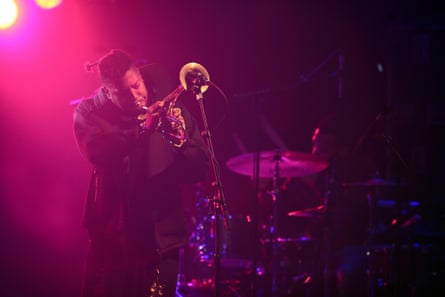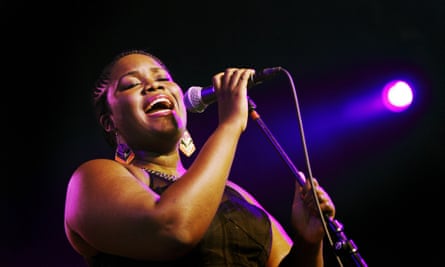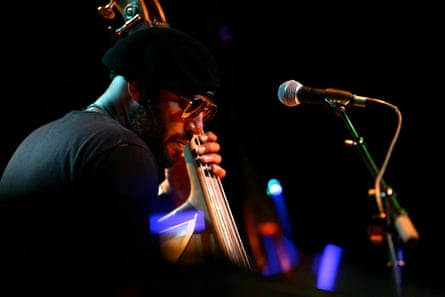Martin Luther King’s baritone voice booms over the PA. “A time comes when silence is betrayal,” he hollers, in an extract from a 1967 speech. His words “silence is betrayal” are looped and repeated until they become a political mantra. We’re at a London jazz festival gig in Shoreditch, and three US musicians – drummer Jaimeo Brown, alto saxophonist Jaleel Shaw and guitarist Chris Sholar – are improvising in front of a cinema screen, accompanying sepia-tinted images of Africa (deserts, elephants, mosques, temples), ancient field recordings of chaingang hollers, recreations of slave songs and prescient pronouncements from King. Amid this multimedia barrage, Brown’s trio make music that mixes Afrobeat rhythms, primeval blues riffs and a kind of aqueous, ambient jazz associated with Miles Davis’s In a Silent Way.
Brown’s trio certainly aren’t reacting to today’s febrile political climate with silence. Their response is pugnacious, emotionally affecting and very beautiful. But the politics here are ambiguous. These aren’t straightforward protest songs or civil rights anthems but complex compositions that incite debate on slavery and incarceration, migration and displacement, culture and identity – yet do so without the band members using words themselves. It’s the kind of aesthetic “sonic politics” that you hear constantly in various forms at this year’s London jazz festival.
Jazz is freighted with historic significance; its every note seems a conscious reference to something that has been played before. Some of the most interesting music at this year’s festival uses such referencing to weave political tales, make unlikely connections, or interrogate our notions of identity.

For many British artists performing at the festival, jazz is a vehicle to explore their own cultural identities. On Friday at Kings Place, the trumpeter Yazz Ahmed will deftly integrate Arabic maqam modes, invoking her Bahraini ancestry, into her fiery hard bop playing. On Monday, the pianist Zoe Rahman played a solo set at Pizza Express that wove Bengali folksongs into the kind of chord voicings associated with Herbie Hancock. On Wednesday the east London singer Zara McFarlane played from her album Arise, using themes derived from her research into her Jamaican heritage and the island’s myriad African-derived rhythmic forms.
Unlike their American counterparts, these British artists tend not to preach from the pulpit. McFarlane’s woozy dub-jazz song Stoke the Fire has taken on a chilling significance in the wake of the Grenfell Tower tragedy (“They stack us tall / and watch us burn / when will they learn / we all fall down”), but generally the politics in her music is implicit, personal rather than doctrinal.

The double bass player and singer Miles Mosley, who played Islington Assembly Hall on Sunday, has the air of the rabble rouser. Fronting his West Coast Get Down – the “Wu-Tang Clan of jazz” – Mosley wears a black beret and gladiatorial combat fatigues, which give him the air of a Black Panther. “I got my shield / I got my sword / forged from Egyptian gold,” he howls on standout song Abraham. “I’m feared / I haven’t cried in years / […] mediocrities everywhere / but not here!” But again, Mosley’s politics are more musical and aesthetic than they are prescriptive, a jazz interpretation of the militant soul and black rock of the 60s and 70s. Abraham, for example, follows a lengthy jazz meditation on Jimi Hendrix’s Voodoo Chile, where Mosely uses a barrage of FX pedals to transform his bowed double bass into a howling guitar.

Perhaps the most fully realised political vision at the festival comes from Christian Scott. Like Wynton Marsalis, he’s a trumpeter from New Orleans who consciously draws on jazz’s rich history. But, in contrast to Marsalis, the history he utilises doesn’t stop in the early 1960s: instead, it incorporates 70s jazz rock, M-Base-inspired funk and echoes of contemporary Dirty South hip-hop while making connections between them. At his sold-out show at Camden’s Electric Ballroom there was everything from the fierce, Red Clay-style soul jazz of West of the West to a swaggering version of Bobby Timmons’s Moanin’; from invocations of antique Louisiana marching bands to tracks such as The Walk, where drummer Corey Fonville triggers Roland 808 samples to recreate the thudding, syncopated sub-bass sounds of New Orleans trap.
Before a valedictory jazz waltz called The Last Chieftain, Scott tells a story about how his grandfather – a chief of Native American and African American ancestry – would empty his family’s house of food and take it to feed the destitute of New Orleans. For Scott, this sacred act was a lesson in the importance of responsibility for everyone that moved beyond tribal identity politics. “There’s no point in saying Black Lives Matter if you’re not going to give a shit about the gay community,” he says. “In all these cases, silence is betrayal.” It’s an ideological manifestation of the open-minded “sonic politics” that seems to define jazz today.
- The London jazz festival continues until 19 November.
